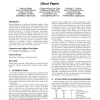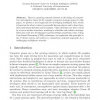98 search results - page 3 / 20 » Using iterated reasoning to predict opponent strategies |
ACSC
2004
IEEE
13 years 11 months ago
2004
IEEE
Table 1 shows the payoff to player one. The same matrix also holds for player two. Player one can gain the maximum 5 points (T = 5) by defection if player two cooperates. However,...
ATAL
2008
Springer
13 years 9 months ago
2008
Springer
Reward shaping is a well-known technique applied to help reinforcement-learning agents converge more quickly to nearoptimal behavior. In this paper, we introduce social reward sha...
CEAS
2005
Springer
14 years 1 months ago
2005
Springer
We discuss how the interaction between spam senders and e-mail users can be modelled as a two-player adversary game. We show how the resulting model can be used to predict the str...
EVOW
2010
Springer
13 years 5 months ago
2010
Springer
The emergence of Grim Trigger as the dominant strategy in the Iterated Prisoner Dilemma (IPD) on a square lattice is investigated for players with finite memory, using three differ...
KI
2008
Springer
13 years 7 months ago
2008
Springer
Abstract. There is a growing research interest in the design of competitive and adaptive Game AI for complex computer strategy games. In this paper, we present a novel approach for...


